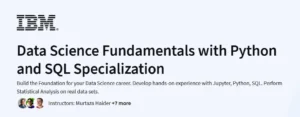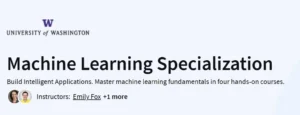What will you learn in this Fundamentals of Reinforcement Learning Course
Markov Decision Processes (MDPs): Formalize decision-making problems using MDPs, a foundational framework in reinforcement learning.
Exploration vs. Exploitation: Understand strategies to balance exploring new actions and exploiting known rewards.
Value Functions: Learn about value functions as tools for optimal decision-making.
Dynamic Programming: Implement dynamic programming methods for solving MDPs efficiently.
Program Overview
1. Welcome to the Course!
⏳ 50 minutes
Introduction to the course structure and objectives.
Meet your instructors and understand the roadmap for the specialization.
2. An Introduction to Sequential Decision-Making
⏳ 3 hours
Explore the exploration-exploitation trade-off in decision-making.
Implement incremental algorithms for estimating action-values.
Compare different algorithms for exploration.
3. Markov Decision Processes
⏳ 3 hours
Translate real-world problems into the MDP framework.
Understand goal-directed behavior through reward maximization.
Differentiate between episodic and continuing tasks.
4. Value Functions & Bellman Equations
⏳ 3 hours
Define policies and value functions.
Understand Bellman equations and their role in reinforcement learning
5. Dynamic Programming
⏳ 3 hours
Compute value functions and optimal policies using dynamic programming.
Implement policy evaluation and improvement methods.
Understand Generalized Policy Iteration as a template for constructing algorithms.
Get certificate
Job Outlook
Equips learners for roles such as Machine Learning Engineer, AI Researcher, and Data Scientist.
Provides foundational knowledge applicable in industries like robotics, finance, healthcare, and game development.
Enhances understanding of decision-making systems and intelligent agent design.
Specification: Fundamentals of Reinforcement Learning
|
FAQs
- Basic understanding of Python programming is recommended.
- Familiarity with fundamental machine learning concepts is helpful but not mandatory.
- The course introduces reinforcement learning (RL) concepts from scratch.
- Suitable for beginners and data science professionals looking to expand into RL.
- Emphasizes hands-on applications over advanced theory initially.
- Markov Decision Processes (MDPs) and RL problem formulation.
- Policy, value functions, and reward systems.
- Key algorithms like Q-learning and Monte Carlo methods.
- Temporal difference learning and policy gradient methods.
- Exploration vs. exploitation strategies.
- Coding exercises implement RL algorithms using Python.
- Projects include building agents to solve simulated environments.
- Emphasis on experimentation with different strategies and reward structures.
- Provides opportunities to visualize agent behavior and learning progress.
- Reinforces theoretical concepts with applied examples.
- Useful in robotics and autonomous systems.
- Applied in gaming AI and simulation environments.
- Enhances decision-making models in finance and operations.
- Supports optimization problems and adaptive systems.
- Skills are transferable across research and industry applications.
- Basics of RL can be grasped in 3–4 weeks with consistent practice.
- Mastering algorithms and tuning agents may take several months.
- Hands-on projects accelerate learning and comprehension.
- Continuous experimentation and testing are key for proficiency.
- Provides a strong foundation for advanced RL and AI applications.





